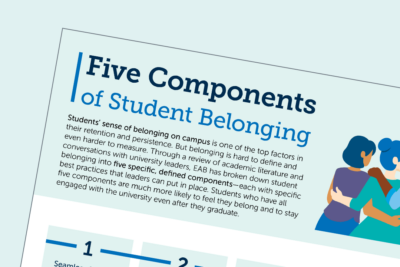In the 2013 study Responding to Students of Concern, EAB demonstrated the shortage of BIT/CARE team outcome evaluations, as few institutions have robust assessment initiatives. Frequent barriers cited by interviewees included lack of time, a dearth of senior interest, and data collection issues. As the Student Affairs Forum team updated our BIT/CARE work across 2017, one of the most surprising findings was the considerable progress colleges and universities have made around BIT/CARE team data collection and outcomes tracking.
Most institutions track immediate BIT/CARE case outcomes
Data from EAB’s 2017 benchmarking initiative on BIT/CARE teams showed that 67% of institutions currently track student outcomes data. The most frequently tracked metrics are immediate case outcomes including withdrawals, hospitalizations, and discharges from case management. Other metrics that teams regularly monitor include health leaves and completed threat assessments. Collecting this information provides insight into case outcomes and time allocated to ongoing student follow up and support.
A growing emphasis to connect BIT/CARE work to student success
While many BIT/CARE teams already collect data about immediate case outcomes, EAB research highlighted a strong interest in conducting more systematic assessment regarding broader student success impacts. In particular, many BIT/CARE chairs highlighted a desire to focus on longer-term personal and academic outcomes for referred students. Currently, 42% of teams track retention of referred students either by semester or academic year. However, EAB data shows that only one-third of institutions currently track referred student GPA or graduation. Frequently cited challenges in tracking this type of data include information being stored in different databases, concerns about privacy, and a general lack of team bandwidth to conduct longer term assessment.
The missing piece: Communicating BIT/CARE team data
While BIT/CARE teams have made great strides since 2013 in tracking outcomes data, they continue to struggle to effectively share this data with institutional stakeholders. This information can be used in a variety of ways: providing a snapshot of annual work to team members, using select data points in faculty outreach training, integrating data around follow-up and case management into divisional resource asks, and beyond. Furthermore, sharing information about how the BIT/CARE team supports student success can be useful in raising awareness of the group’s longer-term impact among institutional stakeholders.
To help BIT/CARE teams improve their communication efforts, we recommend divisional leaders explore the following questions:
- How do you share current metrics with BIT/CARE team members? At what frequency?
- Does your division systematically use BIT/CARE data when making the case for additional resources for mental health, counseling, or case management?
- What are the key metrics or emerging trends that could be incorporated into community outreach and faculty trainings?
- What types of questions do institutional leaders ask about BIT/CARE team work and outcomes?
- How do you share case outcomes and/or student success metrics around retention with divisional and institutional leaders? At what frequency?
Promote successful off-campus mental health care for high-need students
Listen to the webconference recording to learn more about progressive colleges and universities who streamline the referral process for students whose needs are beyond the scope and resources of the campus counseling center. Download the recording and slides.


